Activities and Events
Virtual Information Session for Alumni in Egypt in July 2021
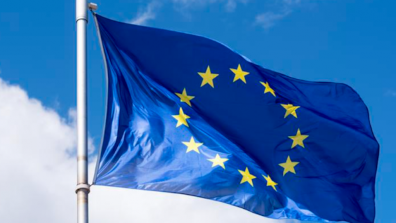
DAAD Cairo
To promote peace, stability and economic prosperity, the European Union has been working with its southern and eastern neighbours and through the European Neighbourhood Policy for many years. Egypt as well has longstanding bilateral science and technology agreements with several EU countries, covering collaborative research, joint funding, mobility schemes and networking. As for the world of science, in recent years, European and Egyptian scientists have continuously fostered their collaboration in the framework of bilateral projects or multilateral research programmes, which increasingly do strengthen as well the general bond between the EU countries and Egypt.
During the virtual Alumni Information Session entitled “EU Contribution in Egypt and its Cooperation with Egyptian Scientific Institution”, speakers from the EU Commission in Egypt, the National Agency for EU Higher Education Cooperation, the Erasmus+ programme as well as from the EU Liaison Office of the German Research Organisations gave an insight and further information for the 55 participants of the event on the scientific cooperation between the EU and Egypt as well as funding opportunities.
The digital event started with enriching welcoming words by Ms. Isabell Mering (Director of the DAAD Regional Office Cairo) and by Mr. Philippe Maupai (Head of Science and Protocol at the German Embassy in Cairo). Dr. Heba Gaber (Research and Innovation Officer at the European Union Delegation to Egypt) was given the opportunity afterwards to give a keynote speech entitled “Collaboration of the EU and Egypt in the Field of Science: Impacts on the EU and Egypt” and she presented the diverse funding opportunities offered by the EU in and for Egypt. Following, Mrs. Beate Körner (Head of Department EU 03 – Partnerships and Cooperation Projects at the National Agency for EU Higher Education Cooperation, DAAD Bonn) presented “The National Agency for EU Higher Education”, a department within the DAAD, in her lecture entitled “The Role of the National Agency for EU Higher Education Cooperation in the Erasmus+ Programme”. The National Agency has been serving since 1987 in the Erasmus+ Programme and its predecessors and thus is one of the most experienced agencies in Europe. Eng. Karim Hamdy, the Acting National Erasmus+ Coordinator at the National Erasmus+ Office in Egypt, afterwards deepened the topic by giving further information about the Erasmus+ activities and funding opportunities in Egypt in his presentation on “Insights into the Erasmus+ Programme in Egypt – Funded Projects and Current Activities in Egypt”.
Followed by these valuable contributions, Mr. Dieter Dollase (Advisor Industrial Leadership & Security at the European Liaison Office of the German Research Organisations – KoWi) rounded off the virtual event by his presentation on “EU Research Funding: Information on Funding Opportunities for Egyptian Researchers of the EU Framework Programme for Research and Innovation”.
In addition to the official programme slots, the participants have been invited for further networking and exchange with each other and the speakers of the virtual event. The networking intended to give the participants the opportunity to exchange experiences and information on EU programmes and to exchange with the experts on individual queries and funding possibilities.
Once again, with the realization of this Information Session for the Egyptian Alumni community, a platform was successfully created to support the active and growing Alumni network, to inform about the diverse EU programmes and funding opportunities as well as to strengthen international academic dialogue and cooperation.
Virtual IT-Science Talk on “Cyber Security" in June 2021
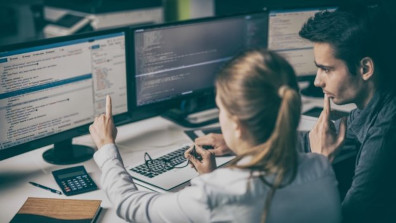
DAAD Cairo
One of the biggest topical challenges in the research environment is the need for centralized cyber security facilities and globally valid regulated agreements to detect and combat cybercrime and to create cyber-resilience. Increasingly, research institutions and scholars are targets for theft of protected data, extortion to secure these data, and foreign economic and scientific espionage. Thus, the protection of data and the prevention of cyber-attacks as well as conscious handling of information and data is more important than ever. In order to address this pressing issue and to illuminate it from different perspectives as well as to raise the awareness of the individual for the importance of cyber security in the field of science and research, the DAAD Regional Office Cairo conducted a virtual IT-Science Talk for Alumni in Egypt on the 3rd of June 2021. The event catered to the importance and implementation of cyber security in the field of science and research.
In the spirit of the DAAD motto “Change by Exchange”, the talk facilitated an opportunity for around 50 Alumni and partners of the DAAD in Cairo to share views on the topic across national borders. Through keynotes by German and Egyptian high-profile speakers, matchmaking and networking, cognizance of cyber security was initiated from different perspectives. Besides the theoretical aspect of critically reviewing the potentials of cyber security at the governmental and institutional level, practical security tools and approaches for future inter-disciplinary innovative cyber security research was as well presented.
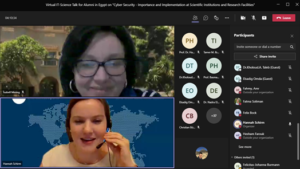
DAAD Cairo
Ms. Isabell Mering, Director of the DAAD Regional Office Cairo, introductory outlined the talk’s concept. By mentioning recent incidents of cyber-attacks at scientific institutions, she proved cyber security as a pressing issue and an imperative task. In line, H. E. Dr Cyrill Jean Nunn, Ambassador of the Federal Republic of Germany to the Arab Republic of Egypt, honoured the talk by enriching Greeting Words. He addressed cyber-attacks among recent news items from the German authority’s perspective, welcoming the German Parliament’s adoption of the IT security Act 2.0 last May. Observing in Germany’s labor market the prominence of Egyptians, “of which not a few work in the field of cyber security and computer technology”, he celebrated the opportunity for bridge-building during the event.
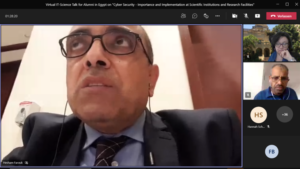
DAAD Cairo
Dr Hesham Farouk Ali AbdelHafez, Assistant to the Minister of Higher Education and Scientific Research (MHSR) for Digital Transformation Egypt, held an initial statement and short presentation on “The Role of Cyber Security for Higher Education Institutions”. The need for capacity-building within graduate studies to engineer digitalization of Egypt was highlighted.
Thereupon, Associate Professor Dr Samir Gaber, Executive Director of Cyber Attacks Detection and Early Warning Systems at the Egyptian Computer Emergency Response Team (CERT) of the National Telecommunication Regulatory Authority (NTRA), and Member of the Technical Secretariat of the Egyptian Supreme Cybersecurity Council (ESCC), presented in-depth the “Comprehensive Strategy for Protecting the ICT Infrastructure in Egypt”, approved for 2017-2021.
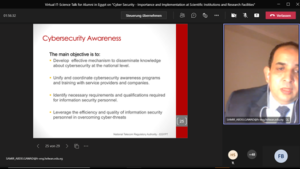
DAAD Cairo
Regarding the “Current Status for Egyptian Research Institutions”, Dr Gaber assessed the different governmental bodies (EG-CERT, NRTA, ESCC) responsible for executing the current strategy. In reference to the “Practical Implementation in Egyptian Research Facilities”, he noted six strategic programmes, covering legislation, digital identity protection, cyber security research, awareness-raising, capacity-building, and integration of the national IT system. Besides the programmes, several projects (‘Egyptian Anti-malware’, ‘Egyptian Cyber Shield’, ‘National IP Scanner’, ‘Cyber-Attacks Early Warning System’, ‘Wireless System’s Security’, ‘Government Domains Assessment Platform’, ‘Cyber Security Awareness’) are currently in operation.
The following key note by Dr Ahmed Shawky Moussa, Assistant Professor of Computer Science at Cairo University, Director of Cairo University Technology Innovation Commercialization Office CU-TICO, and High-Performance Computing Director of AIC at the MCIT, relating “Cyber Security Challenges and Trade-Offs with Scientific Performance and Productivity”, called for a “balance between performance and security”. Consequently, he urged to examine the limit of implementation.
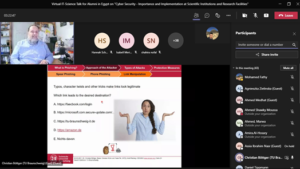
DAAD Cairo
After the networking break, Dr Christian Böttger, Staff Member of Gauß-IT Centre at the Technische Universität Braunschweig in Germany, provided practical protective tools against “E-Mail Security Threats”. He advised the alumni to especially pay attention to the domain area’s validation.
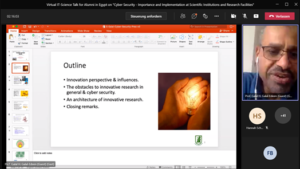
DAAD Cairo
The IT-Science Talk for Alumni was rounded of by the keynote of Professor Dr Galal H. Galal-Edeen, Professor of Information Systems Engineering and Holder of Chair on Innovation at Cairo University, addressing the topic “Innovation and Cyber Security”. He pleaded for a holistic interdisciplinary approach to cyber security research to push invention towards innovation. For this reason, he criticized the rigidity between disciplines in Egyptian universities and argued for mobility amongst them. He considered an assessment of the current state of scientific IT research across Egyptian scientific institutions to facilitate collaborations imperative.
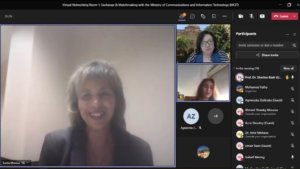
DAAD Cairo
Virtual rooms of the event platform during the digital coffee break were intended to offer the participants the opportunity to network with each other and enhanced the discussion-led exchange with the experts. In break-out room one “Exchange & Matchmaking with the MCIT”, Ms. Samia Moussa, Head of Development Partners Bureau at the MCIT, expressed the Ministry’s matchmaking requests to partner in the Digital Egypt Builders Initiative (DEBI) with German universities specialized in ICT. The initiative offers free scholarships, targeting 1.000 Egyptian university students to obtain master’s degrees within different digital fields at a number of international universities. The event participants which joined break-out room two “Alumni Exchange on the Topic” exchanged on the necessity of awareness-raising and training of cyber security in the field of research, as well as on previous individually made experiences with cyber-attacks.
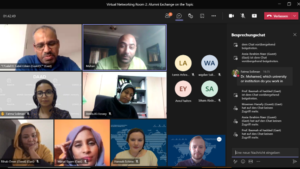
DAAD Cairo
Once again, with the conduction of the IT-Science Talk on “Cyber Security”, a platform was successfully created to support the active and continuously growing network in Egypt as well as to strengthen international academic dialogue and cooperation.
Virtual Alumni Networking Event on "60 Years Plus of DAAD in Egypt" in March 2021
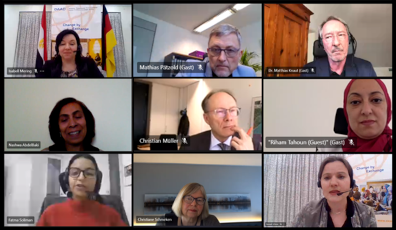
DAAD Cairo
On 30th of March 2021, the DAAD Regional Office Cairo brought together over 80 Alumni and partners in a virtual networking event on the occasion of the DAAD’s 60th anniversary in Egypt.
For more than 60 years, the DAAD has been committed to successfully build and consolidate a stable communication bridge between Germany and Egypt in academia and science. Through its Regional Office in Cairo, it oversees a longstanding and fruitful cooperation with its partners in Egypt as well as one of its largest Alumni networks.
For more than 60 years, the DAAD has been committed to successfully build and consolidate a stable communication bridge between Germany and Egypt in academia and science. Through its Regional Office in Cairo, it oversees a longstanding and fruitful cooperation with its partners in Egypt as well as one of its largest Alumni networks.
The digital event was opened with welcoming words by H.E. Dr Cyrill Jean Nunn, the German Ambassador to Egypt, Prof. Dr Joybrato Mukherjee, DAAD President, Prof. Dr Mohamed Ayman Ashour, Deputy Minister of Higher Education & Scientific Research for University Affairs Egypt, and Ms. Isabell Mering, Director of the DAAD Regional Office Cairo.
In order to reflect back on the successful relationship between both countries, the development of the DAAD network in 60 years and the current situation were discussed in the introductive talk between the current Director of the Regional Office in Cairo, Ms. Isabell Mering, and Dr Matthias Pätzold, currently Secretary General of the Scientific Commission of Lower Saxony and former Director of the DAAD Regional Office Cairo from 1994 until 1999. In this exchange between two directors of the DAAD Regional Office Cairo, topics as the past and current activities of the DAAD Regional Office Cairo, the role of the first female Director of the Regional Office in 60 years, the Alumni work yesterday and today as well as relevant topics of higher education policies such as science diplomacy, sustainability and the higher education system in Egypt were addressed. The talk was moderated by the Deputy Director of the DAAD Regional Office, Ms. Fatma Soliman.
In addition to the experiences made under the influence of the pandemic, the panel discussion entitled “An anniversary of 60 plus years in times of a Pandemic: Challenges and Chances; Innovative Projects; Exchange of experience, reflection and evaluation” was meant to reflect the innovative measures that have contributed to overcoming the barriers and challenges of limited physical exchange and that have ensured the further development of different university projects. Furthermore, current strategies of higher education and internationalization policies as well as the future strategic plans of the participating institutions and decision-making entities have been presented and made visible.
Due to the special challenges of the current situation, the event aimed at discussing best-practice examples of transnational higher education projects, innovative approaches in academic-scientific cooperation as well as lessons learned from the Pandemic in order to guarantee sustainable and future-oriented strategies to enhance academic cooperation even in times of crises and increasing global challenges.
The panelists contributed with highly interesting and very enriching insights from different perspectives into topics such as new forms of communication and cooperation, the need for stronger international cooperation in order to cope with global challenges, the rising demand for affordable and high-quality higher education in Egypt as well as the Alumni Association activities. Furthermore, topics like the future society and academia post-Pandemic in the framework of international cooperation have been discussed. With their contributions, the esteemed panelists Mr. Christian Müller (DAAD Deputy Secretary General), Prof. Dr Mohamed El-Shinawi (Ministry of Higher Education and Scientific Research, Advisor to the Minister), Prof. Dr Matthias Knaut (Academic Founding President of GIU AS), Dr Nashwa Abdelbaki (President of DAAD Alumni Association in Cairo) and Assoc. Prof. Dr Riham Tahoun (DAAD Alumna, DKA Trainer, Department Head of Faculty of Al-Alsun at King Salman International University) gave a complete picture highlighting the relevant higher education policies and strategies implemented in the country and on international level as well as the DAAD engagement in the Egypt. The moderator of the panel Mrs. Christiane Schmeken (Director Strategy at DAAD Bonn and in charge of the DAAD Regional Office Cairo) also underlined the results of the 60 years presence of the DAAD in Cairo, like the high number of Alumni, mutual trust and long-lasting partnership, solid structures and new chances of regional cooperation.
DAAD President Prof. Dr Joybrato Mukherjee congratulated the DAAD Regional Office Cairo for its achievements since the establishment of the office in 1960 in his greeting words. He underlined that the Pandemic also has an impact on the work of the DAAD and he stressed the growing importance of digitalization strategies and sustainable mobility by stating that “the shape of global higher education has changed and the DAAD is dedicated even more now to the question of how international scientific cooperation can continue unhindered by mobility barriers. This question had been on the DAAD’s work and agenda even before the pandemic on account of the drastic climate change impacts of carbon drive mobility. Clearly now, and in the post-corona world, we say form must follow function and physical mobility needs to be reassessed. It remains encouraged when necessary and should be alternated by digital measures where possible”.
At the same time, Prof. Dr. Mukherjee emphasized that the interrelationship between the academic-scientific exchange, the core business of the DAAD, and the social and political conditions of internationalisation have become more and more important for the fulfillment of the DAAD’s tasks. Thus, exchange in academia and science in Egypt and around the world shall continue to be supported. The DAAD would believe that “scientific cooperation across borders is key to solving common global problems, and freedom of science is the pillar for any scientific cross-border cooperation”.
It goes without saying that the event achieved to successfully strengthen once more the already well-established bond between the DAAD, its partners and Alumni in the host country Egypt by highlighting the fruitful work in 60 years of DAAD presence in Egypt. Finally, it should be mentioned that yet there is more to come and the DAAD is already looking forward for many more fruitful future activities and cooperation in Egypt!
Kindly find further information on the recorded event on our Facebook page under following link: https://www.facebook.com/DAADEgypt/videos/472830283869203/
Virtual IT-Science Talk on “Cyber Security" in June 2021
Professor Dr Ashraf Mansour
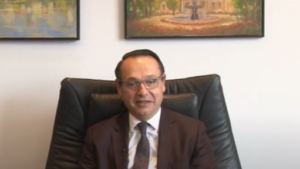
DAAD Cairo
Video Greetings on the occasion of the 60th Anniversary of the DAAD in Egypt by DAAD Alumnus, esteemed Partner of the DAAD Regional Office Cairo, Prime Founder of the GUC and Founder of the Alumni Association in Egypt – Professor Dr Ashraf Mansour.
Watch his video here.
Mrs. Aziza Hamdi
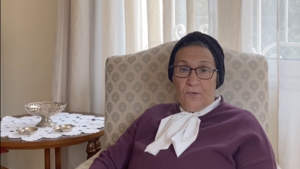
DAAD Cairo
Video Greetings on the occasion of the 60th Anniversary of the DAAD in Egypt by DAAD Alumna, former local employee of the DAAD Regional Office Cairo and former President of the DAAD Alumni Association Egypt – Mrs. Aziza Hamdi.
Watch her video here.
DAAD Alumni Association Egypt (DAV)
General Information
DAAD Alumni Vereine, or the DAAD Alumni Associations, aim to maintain and consolidate social, academic, research and professional relationships among DAAD alumni and their partners in Germany by offering programmes and activities that cater to their professional and personal interests. Their aim is to put their experiences, both old and new, in Germany to use in furthering development and international cooperation processes and intensifying the scientific and cultural interaction for the benefit of both partners.
Contact - We are currently working on filling this part of our website with content!
Success Stories and Portraits
Interview with DAAD Alumna Dr Shimaa Hanafy
Dr Shimaa Hanafy is Assistant Professor of Development Economics at Hankuk University of Foreign Studies (HUFS) in Seoul, South Korea. She received a DAAD scholarship for exceptional graduates from German schools abroad from 2003 to 2008. In this interview Dr Hanafy told us about her thoughts and experiences.
- Dear Dr Hanafy, you received a DAAD scholarship for exceptional graduates from German schools abroad between the years 2003 and 2008. Would you like to tell us a little about the time before your scholarship and a little about your educational path?
I spent the first three and half years of my life with my family in Austria where my father was doing his PhD. My family then moved back to Cairo. Subsequently, my parents decided to send me and my elder sister to the Deutsche Schule der Borromäerinnen Kairo (DSB Kairo), which is one of the leading German Schools in Egypt. I am very grateful for my parents’ decision as it definitely shaped my life in many ways. I spent 14 beautiful years at DSB Kairo, starting from kindergarten in Maadi until my Abitur graduation in May 2003. This is when I happily received the DAAD scholarship to study in Germany.
- How did you decide to study in Germany? What and where did you study in Germany?
I have been extremely interested in studying economics in Germany since about grade 10. I was strongly interested in both the excellent academic education and the cultural exposure. My educational and intercultural experience at the DSB and my father’s experience in studying abroad had a strong impact on me. But, of course, I also had many questions and some doubts about living thousands of kilometers away from my beloved family. Fortunately, however, my teachers at the DSB were enormously helpful, patiently answered many of my questions and strongly encouraged me to take this step. Moreover, the fact that my parents raised me and my sister to be relatively independent, taking responsibility for our own actions, was very helpful and empowering. It was also extremely useful to talk to several DSB alumni, who were already studying in Germany, and learn about their experience.
One event in my past, in particular, provided the final impetus to take this decision: During grade 11, I received the German Pedagogic Exchange Service (PAD) Prize, which included a one-month-roundtrip to Germany in the summer of 2002. I was part of a group of 13 German-speaking, 16- and 17-year-olds from several countries. During and after this trip, I really felt confident about studying in Germany and was, therefore, well-prepared to avail of the DAAD opportunity. As part of the PAD trip, we were guests for two weeks of hosting families in beautiful Traunstein in the South of Germany. I was extremely lucky to be hosted by such a wonderful family. We really bonded very well. The family encouraged me very much to pursue my dream of studying in Germany and generously offered to help me settle in when moving to Germany (which they definitely did when I moved to Germany one year later). They also invited me to visit them frequently. Eighteen years later, we still have a special bond, are in close contact and meet regularly!
During my DAAD scholarship period between 2003 and 2008, I studied economics at Passau University. In summer 2008, I graduated as Diplom-Volkswirtin and moved to Marburg for my PhD in economics and to join the coordination team of the German-Arab Master’s Program “Economic Change in the Arab Region”, which was later transformed into “Economics of the Middle East” at Philipps-Universität Marburg. Both German-Arab Master’s programs were funded by the German Federal Ministry of Economic Cooperation and Development (BMZ) and jointly coordinated with the DAAD and the GIZ.
- What was the focus of your research? What are you personally taking with you from your time in Germany?
During my PhD, I focused on two research pillars. The first was an empirical analysis of location determinants of foreign direct investment (FDI) in Egypt and the effects of FDI on economic growth and development at the level of Egyptian governorates. This project was incredibly challenging due to the multiple obstacles of collecting and analyzing data at the governorate level in Egypt. I was the first to do such an analysis. The second research pillar evolved during my PhD and was an empirical analysis of the socio-economic determinants of voting outcomes in the first parliamentary elections in Egypt after the “Arab Spring”. Results from both research projects were published in international peer-reviewed journals.
It is quite difficult to answer the broad question on what I gained from my time in Germany. Germany quickly became my second home and both my time at DSB Kairo as well as my time in Germany significantly shaped the person that I am today. It is not even easy to draw a strict line between those two phases when it comes to their impact on me. I am absolutely “taking with me” lots of wonderful memories and experiences, life-long friendships, lots of knowledge, academic and professional experiences and much more. I even met my husband in Germany, although we both come from Cairo. We both value the German education system very much and are looking forward to sending our four-year old daughter to the German School in Seoul. Moreover, we both have strong and ongoing academic ties with Germany. As a family, we visit Germany once a year and are looking forward to travelling to Germany again after the current pandemic.
- How was your everyday life in Germany? Did you have any particularly positive and/or negative experiences?
I started my undergraduate studies in the winter semester. I remember that it took some time to get used to the relatively cold, wet and grey weather in comparison to sunny Cairo and also to get used to being thousands of kilometers away from my family and friends. Unlike today, there were no video calls in 2003! However, Germany soon became my second home. I was lucky to meet amazing people and make life-long friends. Good planning and self-discipline were certainly required to balance my studies and extra-curricular activities. I remember spending many hours reading and studying in the library. But I also very much enjoyed the student’s life in Passau, the beautiful “City of Three Rivers”. I became engaged in several extra-curricular activities, including volunteering at the student’s council where I later became an elected member. Furthermore, I worked as a research assistant and teaching tutor starting my second year of studies. All in all, my daily life was extremely full and diverse.
My positive experiences were certainly multiple, ranging from the many warm-hearted people I met, the life-long friendships I made and how well-integrated I felt in German society. I had to laugh on several occasions when some of my German friends, who were applying for a semester abroad, were asking me if I would also like to travel abroad for one or two semesters, while totally forgetting that I was already “abroad” in Germany for my entire Diplom studies. I was always very grateful to how well the DSB equipped me with perfect German, prepared me to study in Germany and to be easily integrated into German society while still preserving my own identity.
Luckily, I had no frequent negative experiences. But one negative experience, in particular, is, unfortunately, unforgettable namely the experience of a fire that broke out in the middle of the night in the building where my husband and I were living. My husband was travelling abroad on a conference at the time. I woke up in the middle of the night to sirens of ambulance and fire trucks and quickly rushed down and out of the building in shock and fear, while also experiencing some breathing difficulties. Luckily, none of the neighbors were seriously injured, although some had to be hospitalized for a few days. We were expecting to move back into the house after a few days. However, the situation was much worse than everyone expected, and it was unclear for several months when residents of the house could move back into their apartments. It was also extremely difficult to find alternative accommodation and we had to have several temporary accommodations for several months. The fire experience and its aftermath have been a tough experience.
- Do you think your time in Germany and the DAAD scholarship for exceptional graduates from German schools abroad was beneficial for your professional life?
Absolutely! The DAAD scholarship allowed me to pursue my dream of studying economics in Germany. I have received an excellent education in economics and great mentoring during my scholarship-supported five years of Diplom studies at Universität Passau. This was the first milestone of my current position in academia. Moreover, the professional and academic experience that I gained as a research assistant and teaching tutor in different chairs of economics, starting in my second study year in Passau, was very enriching and had a strong impact on the development of my career path. Those experiences led to the development of my passion for research and teaching and interest in pursuing an academic career. My studies and experience during my scholarship time were the perfect preparation for my following career milestone at Philipps-Universität Marburg where I worked as a PhD researcher and a member of the academic coordination and teaching team of two BMZ-supported, German-Arab master’s programs in Middle East Economics for six years. All in all, the education and supervision that I received as well as the experience gained in research, teaching, academic and development coordination, during my time in Germany, are extremely beneficial for my current position as an Assistant Professor of Development Economics.
- You are now an assistant professor at HUFS (Hankuk University of Foreign Studies) in Seoul, South Korea. How come and what exactly is it that you do there?
I first came to Seoul in August 2014 with my husband who had accepted a job offer as an Assistant Professor of Middle East Economics. He had just finished his PhD in Germany and I was in the final phase of my PhD writing. We were both excited to start a new adventure and gain more international experience. My plan was to finish my PhD and pursue an academic career. In February 2016, I travelled to Marburg for my PhD defense and received my doctoral degree. Luckily, an assistant professorship in development economics became vacant at Hankuk University of Foreign Studies (HUFS) in Seoul in the same year so I applied, got interviewed and was hired. I have been an Assistant Professor of Development Economics at the Division of International Studies (DIS) at HUFS in Seoul since March 2017. HUFS ranks yearly as the most globalized university in South Korea and has the largest share of international professors and students among universities in Korea. My work typically includes teaching classes of development economics, mentoring and supervising students and conducting my research agenda. I really enjoy very much the international academic working environment and the enriching intercultural exposure at HUFS. My students literally come from all over the world. For example, it is not uncommon to have more than 15 different nationalities in a class of 30 students.
- What still connects you with the DAAD today?
My connection with the DAAD did not stop with the end of my scholarship in summer 2008. On the contrary, I continued to work closely with the DAAD, joining the academic coordination team of the –at that time, new– German-Arab Master’s Program “Economic Change in the Arab Region” at Philipps-Universität Marburg in October 2008. The master’s program was jointly coordinated with the DAAD. One of the fields where we worked intensively together was the selection of DAAD scholarship holders within this program, which was later transformed into the Master’s Program “Economics of the Middle East”. We also collaborated in “fact finding missions” in the process of developing partnerships of the master’s programs with universities in the Arab region.
Moreover, I have participated in several conferences, events and workshops by DAAD in Germany, Europe, the Middle East and Korea over the last decade. For example, I was an invited member of the Expertenkreis (round of experts) of the German-Arab Transformation Partnership by the DAAD, an invited speaker at a DAAD event on German-Arab cooperation in Higher Education at the Permanent Representation of the Federal Republic of Germany to the EU in Brussels, a presenter at a DAAD-Alumni conference on the Arab Spring in Berlin, a participant at a DAAD-funded workshop on sustainability and good governance in Cairo, to name a few.
In South Korea, I have always been keen to put my students at HUFS in touch with the DAAD. For example, many of my undergraduate students at HUFS who want to pursue their master’s degree in Europe come to me for consultation. I always encourage them to get in touch with the DAAD in Korea and to review the DAAD website for matching master’s programs in Germany. Although most of them used to primarily consider universities in England due to the study language, I would say that more and more now apply for master’s programs in Germany and are pleased to find an increasing number of graduate programs that are entirely in English.
Additionally, HUFS receives many regular and exchange students from Germany. In one of my courses this semester on Globalization and Development, German students even make about 40% of the students. I usually have at least 10 German students in my classes every semester, with some DAAD-scholarship holders among them. Even in the current semester, I have more than 10 exchange students from Germany among my students despite the pandemic. All in all, I think there is a rapidly growing interest among German students to study in South Korea in general and at HUFS in particular, as well as an increasing interest of Korean and non-Korean HUFS students to study in Germany. I am certainly looking forward to intensifying the cooperation with the DAAD representation in Seoul in the future.
- You also have DAAD scholarship holders among your students in Seoul. What would you recommend to the new DAAD scholarship holders?
I recommend them to make the best out of this great opportunity, to have as much interaction and exchange as possible with fellow Korean students and to be open to cultural differences. There are also several student organizations at HUFS that offer help and assistance to international students such as the International Student Organization. However, in the current times, I certainly recommend them to be careful and responsible during the pandemic! Luckily, Korea is a beautiful country and offers lots of beautiful outdoor places to visit.
- Dear Dr Hanafy, thank you very much for your valuable time and contribution. Are there any other points you would like to add or specify?
I would like to thank Ms. Hannah Schirm for this interview. It was my absolute pleasure to talk to you! Moreover, I would like to thank the DAAD staff in Bonn, Cairo and all over the world for their tremendous efforts and excellent work to promote higher education and enhance academic and intercultural exchange. I am looking forward to more successful cooperation with the DAAD in the future!
Virtual IT-Science Talk on “Cyber Security" in June 2021

DAAD Cairo
Here, DAAD alumni, as alumnus Prof. Dr Abdel Meguid Kassem, report on encounters, places and moments from the time of his stay abroad that they remember best. They tell how their stay abroad changed them personally and what influence the experience abroad had on their professional career. Watch his video here.
The impact of being a DAAD Alumni: Get to know them and get inspired: Dr Nahla Tawfik

DAAD Cairo
25 years ago, DAAD alumna Dr Nahla Tawfik received her first DAAD scholarship during a university summer course in Heidelberg and has remained in contact with the DAAD ever since.
Dr Nahla Tawfik studied German language and literature at the Al-Alsun Language Faculty at Ain Shams University in Cairo, and graduated in 1997. In 2004 she received her master’s degree and in 2009 she obtained her doctoral degree in Translation Studies after receiving a two-year DAAD scholarship at the Johannes Gutenberg University Mainz. Since 2015 she has been working as an assistant professor for Translation Studies and Linguistics at the Al-Alsun Language Faculty. Her research focuses on questions related to language and translation studies, interculturality and intercultural communication in a German-Arab context, language contact and identity construction. In the field of international cooperation between Germany and Egypt, she headed the DAAD research project “Interculturality in a German-Arab Context” in collaboration with the University of Wuppertal between 2013 and 2016. Moreover, she is a member of the advisory board and member of the digital translator lexicon UeLEX of the Johannes Gutenberg University Mainz, and also member of the Society for Intercultural German Studies (GIG). In 2014 Dr Tawfik was awarded the DAAD Jacob and Wilhelm Grimm Prize for young scholars in German studies for outstanding achievements in researching and teaching the German language, literature and culture, and promoting international cooperation in the field.
Today, in 2021, we would like to warmly congratulate Dr Nahla Tawfik on receiving the Alexander von Humboldt Foundation’s Georg Forster Research Fellowship, in which she has set herself the important goal of expanding German-Egyptian academic relations at university level, particularly in the field of the humanities. In addition, Dr Nahla Tawfik would like to give German Studies current and intercultural impulses by focusing on German-Arab language contact phenomena in everyday German life!
We wish her all the best in this endeavour!
Here you will find her video, where she reports on encounters, places and moments from her stay abroad that she remembers best as well as how her stay abroad changed her personally and what influence the experience abroad had on her professional career.
The impact of being a DAAD Alumni: Get to know them and get inspired: Dr Riham Tahoun

DAAD Cairo
Here, DAAD alumna Dr Riham Tahoun, reports on encounters, places and moments from the time of her stay abroad that she remembers best. Watch her video here.
The impact of being a DAAD Alumni: Get to know them and get inspired: Dr Mo'men El Soudany

© DAAD Cairo
Here, DAAD alumni, as alumnus Dr Mo’men El Soudany, report on encounters, places and moments from the time of his stay abroad that they remember best. They tell how their stay abroad changed them personally and what influence the experience abroad had on their professional career. Watch his video here.
In Memory Of
We are currently working on filling this part of our webiste with content!